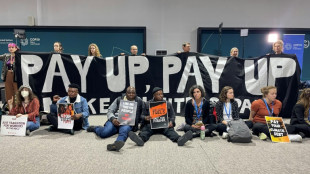
-
 Ireland seek to overcome former coach Schmidt's Wallabies
Ireland seek to overcome former coach Schmidt's Wallabies
-
Detroit survive Bears comeback to make it 10 wins in a row

-
 Mexican actor Silvia Pinal dead at 93
Mexican actor Silvia Pinal dead at 93
-
'Black Friday' deals target inflation-weary US consumers

-
 Liverpool look to deepen Man City crisis, Amorim seeks first Premier League win
Liverpool look to deepen Man City crisis, Amorim seeks first Premier League win
-
Police fire rubber bullets, tear gas at Georgia protesters after PM delays EU bid

-
 England lose three quick wickets in reply to New Zealand's 348
England lose three quick wickets in reply to New Zealand's 348
-
Social media companies slam Australia's under-16 ban

-
 Police fire tear gas at Georgia protesters after PM delays EU bid
Police fire tear gas at Georgia protesters after PM delays EU bid
-
Canada watchdog sues Google over 'anti-competitive' ad tech

-
 Hojlund gives Amorim winning Old Trafford bow, Roma hold Spurs
Hojlund gives Amorim winning Old Trafford bow, Roma hold Spurs
-
Amorim wins first Man Utd home game after rollercoaster ride

-
 France arrests 26 as South Asian migrant trafficking ring smashed
France arrests 26 as South Asian migrant trafficking ring smashed
-
At least 15 dead, 113 missing, in Uganda landslides

-
 Netanyahu threatens 'intensive war' if Hezbollah breaches fragile truce
Netanyahu threatens 'intensive war' if Hezbollah breaches fragile truce
-
Bilbao join Lazio at Europa League summit, Chelsea cruise in Conference League

-
 In Lebanon's Tyre returning residents find no water, little power
In Lebanon's Tyre returning residents find no water, little power
-
Protests in Georgia after PM delays EU bid to 2028

-
 Biden slams Trump tariff threats as 'counterproductive'
Biden slams Trump tariff threats as 'counterproductive'
-
TikTok tactics shake up politics in Romania

-
 'He should do comedy' says Norris of Verstappen comments
'He should do comedy' says Norris of Verstappen comments
-
Americans celebrate Thanksgiving after bitter election

-
 Flood-hit Spain introduces 'climate leave' for workers
Flood-hit Spain introduces 'climate leave' for workers
-
UK's Starmer vows to slash net migration

-
 Recount order, TikTok claims throw Romania election into chaos
Recount order, TikTok claims throw Romania election into chaos
-
Jansen stars for South Africa as Sri Lanka crumble to 42 all out

-
 Bottas set for Mercedes return as Mick Schumacher quits reserve role
Bottas set for Mercedes return as Mick Schumacher quits reserve role
-
Putin threatens Kyiv with new hypersonic missile

-
 Georgia delays EU bid until 2028 amid post-election crisis
Georgia delays EU bid until 2028 amid post-election crisis
-
French PM announces concession in bid to end budget standoff

-
 Guardiola's ingenuity will solve Man City crisis, says Slot
Guardiola's ingenuity will solve Man City crisis, says Slot
-
South Africa in control after Sri Lanka crash to 42 all out

-
 'Nothing left': Flood-hit Spanish town struggles one month on
'Nothing left': Flood-hit Spanish town struggles one month on
-
Israel conducts first strike on Lebanon since ceasefire

-
 'Unrecognisable' Mbappe and Real Madrid hurting after European woes
'Unrecognisable' Mbappe and Real Madrid hurting after European woes
-
Uber and Bolt unveil women-only service in Paris

-
 French cognac workers protest China bottling plan amid tariff threat
French cognac workers protest China bottling plan amid tariff threat
-
World tennis No.2 Swiatek accepts one-month doping suspension

-
 Suaalii to start for Wallabies against Ireland
Suaalii to start for Wallabies against Ireland
-
Farrell backs youngster Prendergast at fly-half for Aussie Test

-
 Suualii to start for Wallabies against Ireland
Suualii to start for Wallabies against Ireland
-
Camavinga joins Real Madrid injury list

-
 Australia passes landmark social media ban for under 16s
Australia passes landmark social media ban for under 16s
-
Nigerian president woos French investment on state visit

-
 Contentious COP29 deal casts doubt over climate plans
Contentious COP29 deal casts doubt over climate plans
-
PSG, Real Madrid toil as giants struggle to get to grips with new Champions League

-
 Lampard appointed manager of 'ambitious' Coventry
Lampard appointed manager of 'ambitious' Coventry
-
Liberian ex-warlord Prince Johnson dies aged 72

-
 K-pop band NewJeans leaves label over 'mistreatment'
K-pop band NewJeans leaves label over 'mistreatment'
-
Sri Lanka crash to record low Test total of 42 in South Africa


Sweat shops: textile industry's dark side
The deadly consequences of fast fashion were spotlighted a decade ago after 1,138 people were killed when the nine-storey Rana Plaza garment factory collapsed in Bangladesh.
While the tragedy piled pressure on top brands churning out ever-rising mountains of clothes to ensure better standards, abuses in the textile industry continue:
- Factory hellholes -
The collapse of Rana Plaza near the capital Dhaka was the worst in a series of disasters in textile factories in Bangladesh, the world's second-largest garment exporter after China, and other Asian countries.
A year earlier, at least 111 workers were killed in a fire at a textile factory in Dhaka that produced for US retail giant Walmart, among others, and more than 250 workers died in a blaze in a factory in the Pakistani city of Karachi that produced jeans for German discount chain KiK.
The scale of the disaster at Rana Plaza, which produced clothes for Primark and Benetton, among others, proved a turning point.
Under intense scrutiny, top brands, retailers and trade unions agreed to work together to improve safety conditions in Bangladeshi factories.
About 1,820 factories -- accounting for more than 80 percent of exports -- have been inspected since. Most have been declared fully or almost fully safe.
While Bangladesh has had no major textile factory disasters since 2013, such tragedies have continued to occur elsewhere.
Several people have died in fires at illegal garment factories in the Indian capital New Delhi and in Morocco, 28 people died when heavy rain flooded an illegal basement factory in the port city of Tangiers in 2021.
- Forced labour allegations -
China is accused of having interned more than a million Uyghurs, a Muslim minority living in the northwestern Xinjiang region, in political re-education camps and exploiting some of them for forced labour in cotton fields.
Beijing has dismissed the charges, saying it is operating vocational training centres to counter religious extremism.
Global brands including Adidas, Gap, Nike and Puma were drawn into the controversy after it emerged they were using cotton from Xinjiang, which produces a fifth of the world's supply.
In 2021, French magistrates opened an inquiry into claims that four fashion groups, including Uniqlo and the owner of Zara, were complicit in crimes against humanity by profiting from forced labour in Xinjiang.
- Rock-bottom wages -
The meagre salaries of textile workers in the Indian subcontinent are often flagged, but being paid a pittance to deliver fast fashion is an issue in Europe and the United States, too.
In Britain in 2020 for example, investigations by the NGO Labour Behind the Label and several media outlets found textile workers in the central English town of Leicester were sometimes earning as little as two British pounds ($2.63) an hour.
Low wages have sparked protests around the world, notably in Asia.
After years of violent, deadly demonstrations in Cambodia, garment workers finally secured a minimum monthly wage that is higher than most other countries in the region. In 2023, it was set at $200.
- Toxic dumping grounds -
In the era of fast fashion, the average person buys 60 percent more clothing than 15 years ago, while each item is kept for only half as long, according to the UN in 2022.
A throw-away culture generates growing mountains of waste, much of which ends up in mega dumps in the southern hemisphere.
"Every second, the equivalent of one garbage truck of textiles is dumped in a landfill or burned", said the UN.
The Dandora landfill in Nairobi, for example, receives 4,000 tons of rubbish per day, according to Changing Markets Foundation.
- Top polluter -
The textile industry is also a major polluter, causing between two and eight percent of global carbon emissions, according to the UN in 2022.
It is responsible for 25 percent of the pollution of the world's waters and a third of microplastic discharges into the oceans -- a toxic substance for fish as well as humans.
L.Dubois--BTB


